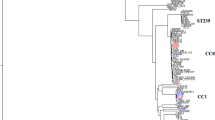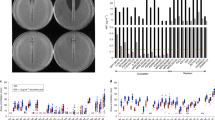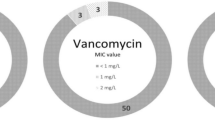Abstract
IT is probable that antibiotic-resistant variants of bacteria arise by spontaneous mutation, and their further spread depends upon selective factors in the environment. Thus an antibiotic-resistant variant has a greater chance of survival when growing in the presence of the antibiotic, and this would explain the increase in the number of penicillin-resistant strains of Staphylococcus pyogenes isolated from hospital patients that has occurred since the introduction of the antibiotic1.
This is a preview of subscription content, access via your institution
Access options
Subscribe to this journal
Receive 51 print issues and online access
$199.00 per year
only $3.90 per issue
Buy this article
- Purchase on Springer Link
- Instant access to full article PDF
Prices may be subject to local taxes which are calculated during checkout
Similar content being viewed by others
References
Fusillo, M. H., Roerig, R. N., and Ernst, K. E., Antibiotics and Chemotherapy, 4, 1202 (1954). Knight, V., and Collins, H. S., Bull. New York Acad. Med., 31, 549 (1954). Wallmark, G., Acta Soc. Medic. Upsal., 59, 209 (1953).
Gould, J. C., and Allan, W. S. A., Lancet, ii, 988 (1954). Rountree, P. M., et al., Med. J. Austral., i, 528 (1956).
Rountree, P. M., and Barbour, G. H., J. Path. Bact., 63, 313 (1951).
Author information
Authors and Affiliations
Rights and permissions
About this article
Cite this article
GOULD, J. Origin of Antibiotic-Resistant Staphylococci. Nature 180, 282–283 (1957). https://doi.org/10.1038/180282b0
Issue Date:
DOI: https://doi.org/10.1038/180282b0
Comments
By submitting a comment you agree to abide by our Terms and Community Guidelines. If you find something abusive or that does not comply with our terms or guidelines please flag it as inappropriate.



